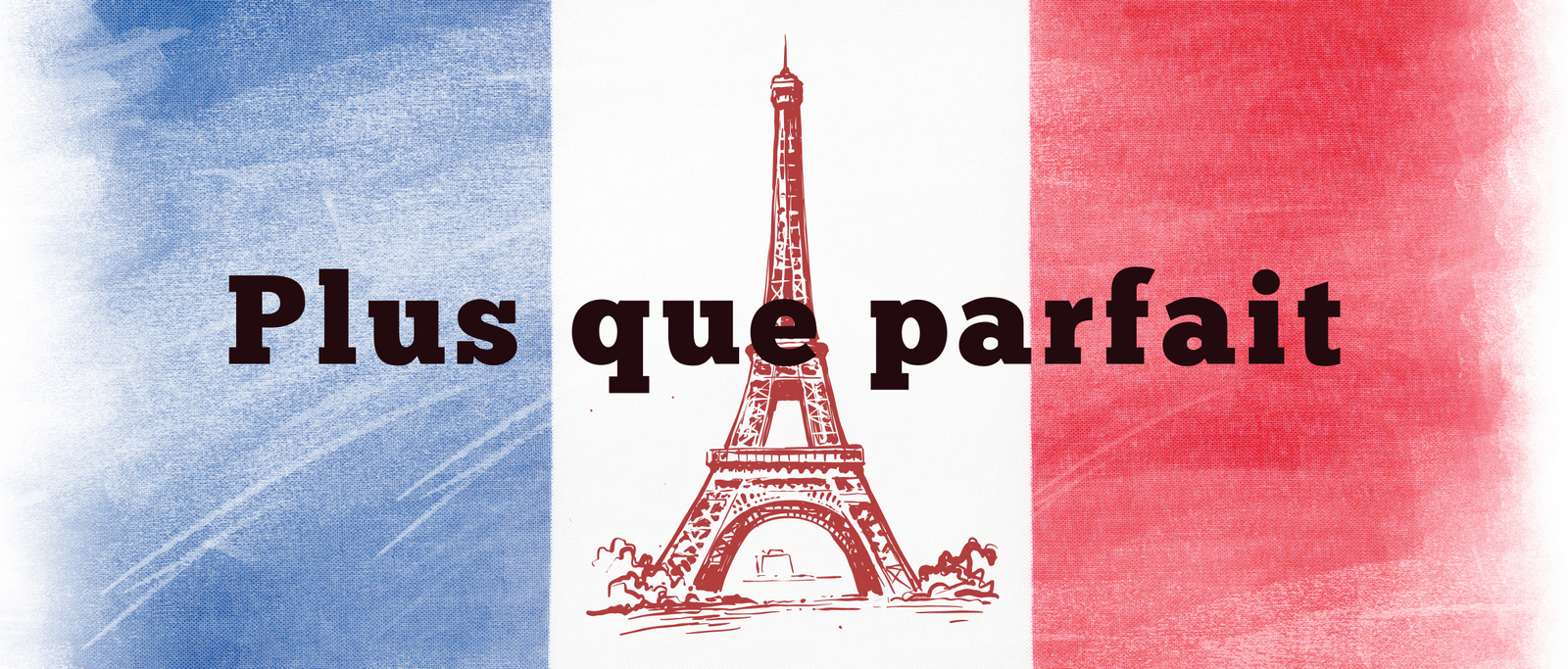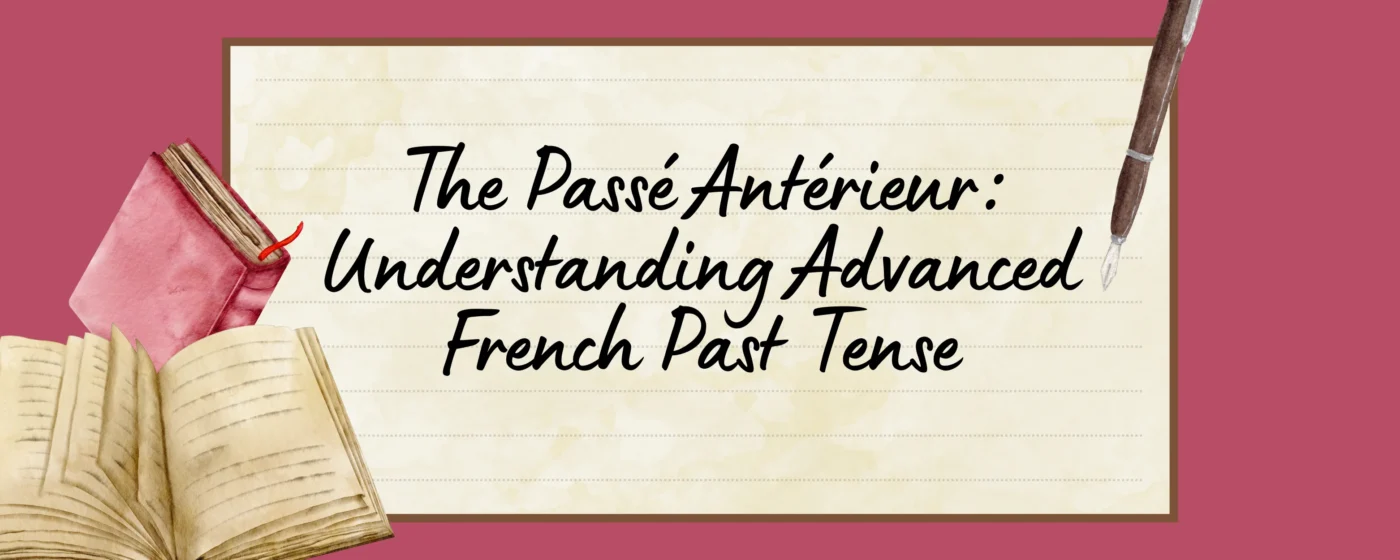The plus-que-parfait tense in French, equivalent to the past perfect tense in English, is essential for storytelling and providing background information. It describes actions that were completed before another past event. This article will cover its formation, usage, and examples to enhance your understanding.
What is the Plus-que-parfait?
The plus-que-parfait tense in French is used to express actions that had occurred before another past action, similar to the past perfect tense in English. It combines the imperfect tense of “avoir” or “être” with the past participle of the main verb. For example, “Il avait fini son travail avant de partir,” means “He had finished his work before leaving.”
When to Use the Plus-que-parfait in French
The plus-que-parfait is used in French to establish a sequence of past events, indicating that one action occurred before another past action. It often appears with other past tenses such as the imparfait, passé composé, and passé simple to provide context or background information. Here are some scenarios and examples:
Sequential Actions: To show that one action was completed before another began.
Example: “Il avait déjà mangé quand je suis arrivé.” (He had already eaten when I arrived.)
Reported Speech: When reporting what someone said in the past about an even earlier event.
Example: “Elle a dit qu’elle avait fini le projet.” (She said she had finished the project.)
Conditional Statements: In hypothetical situations and conditional sentences.
Example: “Si j’avais su, je serais venu plus tôt.” (If I had known, I would have come earlier.)
Narrative Background: Providing background information in a story.
Example: “Il pleuvait et la rue était déserte. Les magasins avaient fermé tôt ce jour-là.” (It was raining, and the street was deserted. The shops had closed early that day.)
How to Conjugate the Plus-que-parfait in French?
Using Avoir and Être as Auxiliary Verbs
To conjugate the plus-que-parfait, you need the imperfect forms of “avoir” or “être” as auxiliary verbs, followed by the past participle of the main verb.
Avoir:
- J’avais
- Tu avais
- Il/Elle/On avait
- Nous avions
- Vous aviez
- Ils/Elles avaient
Être:
- J’étais
- Tu étais
- Il/Elle/On était
- Nous étions
- Vous étiez
- Ils/Elles étaient
Example with “parler” (to speak):
Affirmative:
- J’avais parlé (I had spoken)
- Tu avais parlé (You had spoken (singular)
- Il/Elle/On avait parlé (He/She/One had spoken)
- Nous avions parlé (We had spoken)
- Vous aviez parlé (You had spoken (plural/formal)
- Ils/Elles avaient parlé (They had spoken)
Negative:
- Je n’avais pas parlé (I had not spoken)
- Je n’avais pas parlé
- Tu n’avais pas parlé
- Il/Elle/On n’avait pas parlé
- Nous n’avions pas parlé
- Vous n’aviez pas parlé
- Ils/Elles n’avaient pas parlé
Il était fâché parce que j’avais parlé de son secret.
(He was angry because I had spoken about his secret.)
Example with “aller” (to go):
Affirmative:
- J’étais allé(e) (I had gone)
- Tu étais allé(e) (You had gone, singular)
- Il/Elle/On était allé(e) (He/She/One had gone)
- Nous étions allé(e)s (We had gone)
- Vous étiez allé(e)(s) (You had gone, plural/formal)
- Ils/Elles étaient allé(e)s (They had gone)
Negative:
- Je n’étais pas allé(e) (I had not gone)
- Tu n’étais pas allé(e) (You had not gone, singular)
- Il/Elle/On n’était pas allé(e) (He/She/One had not gone)
- Nous n’étions pas allé(e)s (We had not gone)
- Vous n’étiez pas allé(e)(s) (You had not gone, plural/formal)
- Ils/Elles n’étaient pas allé(e)s (They had not gone)
Elle était triste parce qu’elle n’était pas allée à la fête.
(She was sad because she had not gone to the party.)
Avoir or Être
| Pronoun | Auxiliary (avoir) | Past Participle | Example Sentence (Affirmative) | Example Sentence (Negative) |
| Je | avais | parlé | J’avais parlé à mon ami. | Je n’avais pas parlé à mon ami. |
| Tu | avais | fini | Tu avais fini tes devoirs. | Tu n’avais pas fini tes devoirs. |
| Il/Elle | avait | vendu | Il avait vendu sa voiture. | Il n’avait pas vendu sa voiture. |
| Nous | avions | fait | Nous avions fait les courses. | Nous n’avions pas fait les courses. |
| Vous | aviez | vu | Vous aviez vu le film avant moi. | Vous n’aviez pas vu le film avant moi. |
| Ils/Elles | avaient | pris | Ils avaient pris le train de 8 heures. | Ils n’avaient pas pris le train de 8 heures. |
| Pronoun | Auxiliary (être) | Past Participle | Example Sentence (Affirmative) | Example Sentence (Negative) |
| Je | étais | allé(e) | J’étais allé(e) à Paris l’année précédente. | Je n’étais pas allé(e) à Paris l’année précédente. |
| Tu | étais | arrivé(e) | Tu étais arrivé(e) à l’heure pour le rendez-vous. | Tu n’étais pas arrivé(e) à l’heure pour le rendez-vous. |
| Il/Elle | était | monté(e) | Il était monté au sommet de la tour. | Il n’était pas monté au sommet de la tour. |
| Nous | étions | resté(e)(s) | Nous étions resté(e)(s) à la maison toute la journée. | Nous n’étions pas resté(e)(s) à la maison toute la journée. |
| Vous | étiez | parti(e)(s) | Vous étiez parti(e)(s) avant midi. | Vous n’étiez pas parti(e)(s) avant midi. |
| Ils/Elles | étaient | venu(e)(s) | Ils étaient venus en avance pour la réunion. | Ils n’étaient pas venus en avance pour la réunion. |
Reflexive Verbs in Plus-que-parfait
For reflexive verbs, the reflexive pronoun is placed before the auxiliary verb. In negative sentences, “ne” is placed before the reflexive pronoun and “pas” after the auxiliary verb.
Affirmative:
- Je m’étais lavé(e) (I had washed myself)
- Tu t’étais lavé(e) (You had washed yourself, singular)
- Il/Elle/On s’était lavé(e) (He/She/One had washed himself/herself/oneself)
- Nous nous étions lavé(e)s (We had washed ourselves)
- Vous vous étiez lavé(e)(s) (You had washed yourself/yourselves, plural/formal)
- Ils/Elles s’étaient lavé(e)s (They had washed themselves)
Negative:
- Je ne m’étais pas lavé(e) (I had not washed myself)
- Tu ne t’étais pas lavé(e) (You had not washed yourself, singular)
- Il/Elle/On ne s’était pas lavé(e) (He/She/One had not washed himself/herself/oneself)
- Nous ne nous étions pas lavé(e)s (We had not washed ourselves)
- Vous ne vous étiez pas lavé(e)(s) (You had not washed yourself/yourselves, plural/formal)
- Ils/Elles ne s’étaient pas lavé(e)s (They had not washed themselves)
Ils étaient sales parce qu’ils ne s’étaient pas lavés.
They were dirty because they had not washed themselves.
Participe Passé: The Past Participle
Regular Verbs
-er Verbs: Drop -er, add -é.
Example: parler -> parlé
-ir Verbs: Drop -ir, add -i.
Example: finir -> fini
-re Verbs: Drop -re, add -u.
Example: vendre -> vendu
Irregular Verbs
Irregular verbs have unique past participles that need to be memorized or looked up.
Examples:
- Être (to be) -> été
- Avoir (to have) -> eu
- Faire (to do) -> fait
- Voir (to see) -> vu
- Prendre (to take) -> pris
Grammar Woes? We Can Help!
Get support from La Forêt’s experts—no more guesswork or frustration!
Agreement of the Participe Passé in the Plus-que-parfait
In French, the past participle (participe passé) may need to agree in gender and number with the subject or object, depending on the auxiliary verb used (être or avoir) and certain grammatical rules.
Verbs Using Être
For verbs conjugated with “être” in the plus-que-parfait, the past participle agrees in gender and number with the subject.
Examples:
- Masculine Singular: Il était allé (He had gone)
- Feminine Singular: Elle était arrivée (She had arrived)
- Masculine Plural:Ils étaient partis (They had left)
- Feminine Plural:Elles étaient venues (They had come)
Reflexive Verbs
Reflexive verbs also use “être” as the auxiliary verb, so the past participle agrees with the subject in gender and number.
Examples:
- Masculine Singular: Il s’était lavé (He had washed himself)
- Feminine Singular: Elle s’était brossée les cheveux
- Masculine Plural:Ils s’étaient habillés (They had dressed themselves)
- Feminine Plural:Elles s’étaient réveillées (They had woken up)
In negative sentences, the agreement rules remain the same.
Examples:
Masculine Singular: Il ne s’était pas lavé (He had not washed himself)
Feminine Singular: Elle ne s’était pas lavée (She had not washed herself)
Verbs Using Avoir
For verbs conjugated with “avoir,” the past participle generally does not agree with the subject. However, it agrees in gender and number with a preceding direct object.
Examples without preceding direct object:
- Masculine Singular: Il avait mangé (He had eaten)
- Feminine Singular: Elle avait mangé (She had eaten)
- Masculine Plural: Ils avaient mangé (They had eaten)
- Feminine Plural: Elles avaient mangé (They had eaten)
Examples with preceding direct object:
Direct Object Pronoun: Les fleurs qu’il avait achetées étaient belles. (The flowers that he had bought were beautiful.)
Here, “fleurs” is a direct object preceding the verb, so “achetées” agrees in gender (feminine) and number (plural).
Direct Object Pronoun: La lettre qu’elle avait écrite était longue. (The letter that she had written was long.)
Here, “lettre” is a direct object preceding the verb, so “écrite” agrees in gender (feminine) and number (singular).
Exception: No Agreement with Indirect Objects
When the past participle is preceded by an indirect object, no agreement is made.
Example:
Elle avait parlé à ses amis. (She had spoken to her friends.)
Here, “ses amis” is an indirect object, so “parlé” does not change.
Common Mistakes and Tips
Even native French speakers can stumble with the plus-que-parfait, so don’t be worried if you make mistakes at first. Here are some common errors to watch out for:
- Forgetting to use the imperfect auxiliary: Remember to conjugate “avoir” or “être” in the imperfect tense.
- Incorrect past participle form: Double-check the correct form of the past participle for each verb.
- Incorrect agreement: Pay attention to the agreement rules for the past participle.
To avoid these mistakes, practice regularly. Read French texts and listen to French audios to get a feel for how the plus-que-parfait is used in context and for fluidity.
Practice Exercises
Let’s test your knowledge with some practice sentences. Fill in the blanks with the correct form of the verb in the plus-que-parfait:
- Quand je suis arrivé, elle _______ (partir).
- Nous _______ (manger) avant de sortir.
- Il _______ (être) malade depuis plusieurs jours.
- Elles _______ (finir) leurs devoirs avant de regarder la télévision.
- Vous _______ (voir) ce film auparavant?
Answer key:
- était partie
- avions mangé
- avait été
- avaient fini
- aviez vu
Conclusion
Understanding the plus-que-parfait is crucial for fluency in French storytelling and writing. We’ve covered its formation, usage, and agreement rules. Practice with provided examples and exercises to master this tense. For extra help, consider joining La Forêt French Class.
Frequently Asked Questions
Q: What is the difference between passé antérieur and plus-que-parfait?
Ans: The passé antérieur and plus-que-parfait both refer to actions completed before another past action. However, the passé antérieur is used primarily in formal writing, such as literature and historical texts, while the plus-que-parfait is more common in everyday conversation and writing. For more in-depth learning, La Forêt French Class offers excellent resources.
Q: What is the difference between plus-que-parfait and conditionnel passé?
Ans: The plus-que-parfait indicates an action that had occurred before another past event, while the conditionnel passé expresses hypothetical or conditional past actions that would have happened under different circumstances.
Q: What is passé antérieur used for?
Ans: The passé antérieur is mainly used in formal, literary, or historical contexts to describe actions completed before another past action. It’s less common in everyday speech.
Q: Why is futur antérieur used?
Ans: The futur antérieur is used to describe actions that will have been completed before a specified future moment. It helps in projecting forward in time while referencing a prior action. To practice using futur antérieur and other tenses fluently, La Forêt French Class offers comprehensive lessons and exercises.





